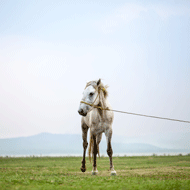MP calls for action on horse tethering

Tethering is now being used as a way of keeping horses without purchasing land.
An MP is calling for tougher action on horse tethering, as charities and local authorities are often powerless to legally prevent owners from inappropriately tethering horses.
Tethering is the practice of attaching a horse to a stake in the ground using a collar, or rope tied around its neck and fastened to a chain.
While this is intended as a short-term method for securing horses, Luke Hall, MP for Thornbury and Yate, said it is now being used as a way of keeping horses without purchasing land. Horses are grazed on private or public grassland, often by the side of busy roads.
Welfare concerns
Speaking at a recent parliamentary debate, Mr Hall said it is “virtually impossible to monitor the welfare of these animals” and they they can be moved on quickly before their keepers can be found or prosecuted.
As a result, around 3,500 horses are in a state of potentially compromised welfare, with little to no hope of intervention from charities as the law does not specifically state that tethering is a welfare concern.
Welfare issues highlighted during the debate included cases of horses getting tangled in fly-tipped rubbish, strangling themselves whilst trying to escape, running onto busy roads, being harassed by local children, lack of food, water and shelter and giving birth to foals while tethered.
Research carried out in South Wales by the University of Bristol previously found that 10 per cent of tethered horses had young foals; up to 90 per cent were not given water regularly; no shelter was given in over 80 per cent of cases and less than three per cent of equines spent more than five minutes a day away from the tether. Additionally, sites contained potential hazards in 50 per cent of cases and only a third of equines were visited at least every six hours, as is recommended.
Taking action
Mr Hall said this offers evidence that the welfare code is not being followed, and that the five freedoms outlined in the Animal Welfare Act are not being met in these cases. However, often cases of long-term tethering are not deemed to be enough of a breach of the Act for action to be taken, Mr Hall added.
The MP is calling for a 24-hour legal limit on how long equines can be tethered and a total ban on tethering by the roadside or in other dangerous locations. In addition, if tethering is the only method of keeping horses, they should not be kept. Finally, Mr Hall called for a mandatory requirement for all local councils to employ animal welfare officers.
Responding, parliamentary under-secretary of state for Defra, David Rutley, said: “The strong arguments made today and the concerns that have been raised mean that I shall call for a meeting with key stakeholders in the months ahead to see what more can be done in sharing and documenting best practice on horse tethering and ensuring that messages on best practice are more actively disseminated to horse owners.”



 RCVS Knowledge has welcomed Professor Peter Cockcroft as editor-in-chief for Veterinary Evidence.
RCVS Knowledge has welcomed Professor Peter Cockcroft as editor-in-chief for Veterinary Evidence.